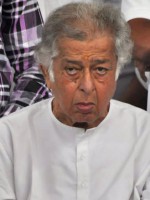Kishore Kumar is a Actor, Director, Scriptwriter, Producer and Playback Singer Indian born on 4 august 1929 at Khandwa (Inde)
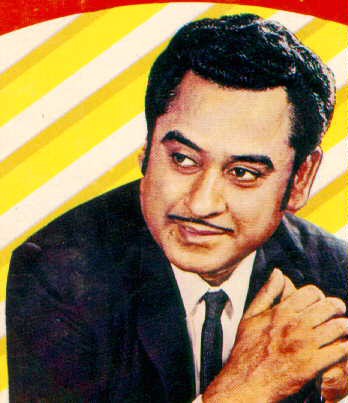
Kishore Kumar (4 August 1929 – 13 October 1987) was an Indian film playback singer, actor, lyricist, composer, producer, director, and screenwriter. He is considered one of the most successful playback singers of the Hindi film industry. Apart from Hindi, he sang in many Indian languages including Bengali, Marathi, Assamese, Gujarati, Kannada, Bhojpuri, Malayalam, Odia, and Urdu. He has also sung in private albums in several languages especially in Bengali which are noted as all time classics. He won 8 Filmfare Awards for Best Male Playback Singer and holds the record for winning the most Filmfare Awards in that category. He was awarded the "Lata Mangeshkar Award" by the Madhya Pradesh government and from that year onwards, the Madhya Pradesh Government initiated a new award called the "Kishore Kumar Award" for contributions to Hindi cinema.
Kumar's third marriage was to Yogeeta Bali, and lasted from 1976 to 4 August 1978. Kishore was married to Leena Chandavarkar from 1980 until his death. He had two sons, Amit Kumar with Ruma, and Sumit Kumar with Leena Chandavarkar.
Kumar is said to have been paranoid about not being paid. During recordings, he would sing only after his secretary confirmed that the producer had made the payment. On one occasion, when he discovered that his dues had not been fully paid, he appeared on set with makeup on only one side of his face. When the director questioned him, he replied "Aadha paisa to aadha make-up." (Half make-up for half payment). On the sets of Bhai Bhai, Kishore Kumar refused to act because the director M V Raman owed him ₹ 5,000. Ashok Kumar persuaded him to do the scene but when the shooting started, Kumar walked across the floor, walked a few places and said, Paanch Hazzar Rupaiya (five thousand rupees) and did a somersault. After he reached the end of the floor, he left the studio. On another occasion, when producer R.C. Talwar did not pay his dues in spite of repeated reminders, Kumar arrived at Talwar's residence and shouting "Hey Talwar, de de mere aath hazaar" ("Hey Talwar, give me my eight thousand") every morning until Talwar paid him.
The film Anand (1971) was originally supposed to star Kumar and Mehmood Ali in the lead. Hrishikesh Mukherjee, the director of the film, was asked to meet Kumar to discuss the project. However, when he went to Kumar's house he was driven away by the gatekeeper due to a misunderstanding. Kumar—himself a Bengali—had not been paid for a stage show organized by another Bengali man and had instructed his gatekeeper to drive away this "Bengali", if he ever visited the house. Consequently, Mehmood had to leave the film as well, and new actors (Rajesh Khanna and Amitabh Bachchan) were signed up for the film.
In spite of his "no money, no work" principle, sometimes Kumar recorded for free even when the producers were willing to pay. Such films include those produced by Rajesh Khanna and Danny Denzongpa. On one occasion, Kumar helped actor-turned-producer Bipin Gupta by giving him ₹ 20,000 for the film Dal Mein Kala (1964). When actor Arun Kumar Mukherjee—one of the first persons to appreciate Kishore's singing talent—died, Kumar regularly sent money to Mukherjee's family in Bhagalpur.
Many journalists and writers have written about Kishore Kumar's seemingly eccentric behavior. He placed a sign that said "Beware of Kishore" at the door of his Warden Road flat. Once, producer-director H. S. Rawail, who owed him some money, visited his flat to pay the dues. Kumar took the money and when Rawail offered to shake hands with him, Kumar reportedly put Rawail's hand in his mouth, bit it and asked "Didn’t you see the sign?". Rawail laughed off the incident and left quickly. According to another reported incident, once Kumar was due to record a song for producer-director G. P. Sippy. As Sippy approached his bungalow, he saw Kumar going out in his car. Sippy asked Kumar to stop his car but Kumar increased his speed. Sippy chased him to Madh Island where Kumar finally stopped his car near the ruined Madh Fort. When Sippy questioned his strange behavior, Kumar refused to recognize or talk to him and threatened to call the police. The next morning, Kumar reported for the recording session. An angry Sippy questioned him about his behaviour the previous day but Kumar said that Sippy must have dreamt the incident and said that he was in Khandwa on the previous day.
Once, a producer went to court to get a decree that Kumar must follow the director's orders. As a consequence, he obeyed the director to the letter. He refused to alight from his car until the director ordered him to do so. After filming a car scene in Mumbai, Kumar drove until he reached Khandala because the director forgot to say "Cut". In the 1960s, a financier named Kalidas Batvabbal, who was disgusted with Kumar's alleged lack of cooperation during the shooting of Half Ticket, reported to the income tax authorities, who raided his house. Later, Kumar invited Batvabbal to his home, asked him to enter a cupboard for a chat and locked him inside. He unlocked Batvabbal after two hours and told him, "Don’t ever come to my house again".
Kishore Kumar was a loner; in an interview with Pritish Nandy (1985) he said that he had no friends—he preferred talking to his trees instead. Once, when a reporter made a comment about how lonely he must be, Kishore Kumar took her to his garden, named some of the trees there and introduced them to the reporter as his closest friends.
Source : Wikidata
Kishore Kumar

Birth name Abhas Kumar Gangopadhyay dit Ganguly ()
Nationality Inde
Birth 4 august 1929 at Khandwa (Inde)
Death 13 october 1987 (at 58 years) at Mumbai (Inde)
Nationality Inde
Birth 4 august 1929 at Khandwa (Inde)
Death 13 october 1987 (at 58 years) at Mumbai (Inde)
Biography
Kishore Kumar married four times. His first wife was Bengali singer and actress Ruma Guha Thakurta aka Ruma Ghosh. Their marriage lasted from 1950 to 1958. His second wife was actress Madhubala, who had worked with him on many films including his home production Chalti Ka Naam Gaadi (1958) and Jhumroo (1961). When Kumar proposed to her, Madhubala was sick and was planning to go to London for treatment. She had a ventricular septal defect (hole in the heart), and he was married to Ruma. After his divorce, the couple had a civil wedding in 1960 and Kishore Kumar converted to Islam and reportedly changed his name to Karim Abdul. His parents refused to attend. The couple also had a Hindu ceremony to please Kumar's parents, but Madhubala was never truly accepted as his wife. Within a month of her wedding she moved back to her bungalow in Bandra because of tension in the Kumar household. They remained married but under great strain for the remainder of Madhubala's life. Their marriage ended with Madhubala's death on 23 February 1969.Kumar's third marriage was to Yogeeta Bali, and lasted from 1976 to 4 August 1978. Kishore was married to Leena Chandavarkar from 1980 until his death. He had two sons, Amit Kumar with Ruma, and Sumit Kumar with Leena Chandavarkar.
Kumar is said to have been paranoid about not being paid. During recordings, he would sing only after his secretary confirmed that the producer had made the payment. On one occasion, when he discovered that his dues had not been fully paid, he appeared on set with makeup on only one side of his face. When the director questioned him, he replied "Aadha paisa to aadha make-up." (Half make-up for half payment). On the sets of Bhai Bhai, Kishore Kumar refused to act because the director M V Raman owed him ₹ 5,000. Ashok Kumar persuaded him to do the scene but when the shooting started, Kumar walked across the floor, walked a few places and said, Paanch Hazzar Rupaiya (five thousand rupees) and did a somersault. After he reached the end of the floor, he left the studio. On another occasion, when producer R.C. Talwar did not pay his dues in spite of repeated reminders, Kumar arrived at Talwar's residence and shouting "Hey Talwar, de de mere aath hazaar" ("Hey Talwar, give me my eight thousand") every morning until Talwar paid him.
The film Anand (1971) was originally supposed to star Kumar and Mehmood Ali in the lead. Hrishikesh Mukherjee, the director of the film, was asked to meet Kumar to discuss the project. However, when he went to Kumar's house he was driven away by the gatekeeper due to a misunderstanding. Kumar—himself a Bengali—had not been paid for a stage show organized by another Bengali man and had instructed his gatekeeper to drive away this "Bengali", if he ever visited the house. Consequently, Mehmood had to leave the film as well, and new actors (Rajesh Khanna and Amitabh Bachchan) were signed up for the film.
In spite of his "no money, no work" principle, sometimes Kumar recorded for free even when the producers were willing to pay. Such films include those produced by Rajesh Khanna and Danny Denzongpa. On one occasion, Kumar helped actor-turned-producer Bipin Gupta by giving him ₹ 20,000 for the film Dal Mein Kala (1964). When actor Arun Kumar Mukherjee—one of the first persons to appreciate Kishore's singing talent—died, Kumar regularly sent money to Mukherjee's family in Bhagalpur.
Many journalists and writers have written about Kishore Kumar's seemingly eccentric behavior. He placed a sign that said "Beware of Kishore" at the door of his Warden Road flat. Once, producer-director H. S. Rawail, who owed him some money, visited his flat to pay the dues. Kumar took the money and when Rawail offered to shake hands with him, Kumar reportedly put Rawail's hand in his mouth, bit it and asked "Didn’t you see the sign?". Rawail laughed off the incident and left quickly. According to another reported incident, once Kumar was due to record a song for producer-director G. P. Sippy. As Sippy approached his bungalow, he saw Kumar going out in his car. Sippy asked Kumar to stop his car but Kumar increased his speed. Sippy chased him to Madh Island where Kumar finally stopped his car near the ruined Madh Fort. When Sippy questioned his strange behavior, Kumar refused to recognize or talk to him and threatened to call the police. The next morning, Kumar reported for the recording session. An angry Sippy questioned him about his behaviour the previous day but Kumar said that Sippy must have dreamt the incident and said that he was in Khandwa on the previous day.
Once, a producer went to court to get a decree that Kumar must follow the director's orders. As a consequence, he obeyed the director to the letter. He refused to alight from his car until the director ordered him to do so. After filming a car scene in Mumbai, Kumar drove until he reached Khandala because the director forgot to say "Cut". In the 1960s, a financier named Kalidas Batvabbal, who was disgusted with Kumar's alleged lack of cooperation during the shooting of Half Ticket, reported to the income tax authorities, who raided his house. Later, Kumar invited Batvabbal to his home, asked him to enter a cupboard for a chat and locked him inside. He unlocked Batvabbal after two hours and told him, "Don’t ever come to my house again".
Kishore Kumar was a loner; in an interview with Pritish Nandy (1985) he said that he had no friends—he preferred talking to his trees instead. Once, when a reporter made a comment about how lonely he must be, Kishore Kumar took her to his garden, named some of the trees there and introduced them to the reporter as his closest friends.
Usually with
Filmography of Kishore Kumar (144 films)
Actor

Love in Bombay (2013)
Directed by Joy Mukherjee
Actors Joy Mukherjee, Waheeda Rehman, Ashok Kumar, Zeenat Aman, Kishore Kumar, Rehman
Rating60%





This film is a simple story of a village boy, Baadal (Joy Mukherjee) who meets a girl from the city, Preeti (Waheeda Rehman) in the most unusual circumstances and the couple eventually fall in love, and wish to get married only to find Preeti’s scheming father, played by Rehman and her fiancé, Roshan try all methods to separate the couple. There’s a lot of drama, jealousy, and a challenge that ensues, but Baadal ends up triumphant through it all. The most fun element was Kishore Kumar‘s character, Ganpat Rao who effortlessly makes you smile from the time he enters the scene. Then there’s the moment of unity for actor brothers, Ashok Kumar and Kishore Kumar which was heartwarming for more reasons than just their screen presence together.
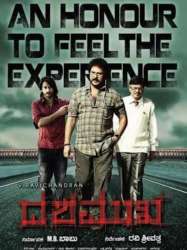
Dashamukha (2012)
Actors V Ravichandaran, Anant Nag, Chetan Kumar, Devaraj, Saritha, Ravi Kale
Rating64%





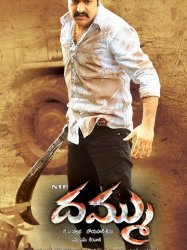
Dhammu (2012)
, 2h35Genres Drama, Thriller, Action
Actors Nandamuri Taraka Rama Rao, Trisha Krishnan, Karthika Nair, Venu Thottempudi, Suman, Abhinaya
Rating49%





Rama Chandra (NTR Jr) is an orphan who leads a simple life along with his friend (played by Ali). He falls in love with Sathya (Trisha Krishnan), who is a very rich girl. Sathya imposes a condition that Rama Chandra's family history and pedigree are very important. At this very moment, Rama Chandra comes to know that a rich and powerful royal family is on the lookout to adopt an heir and Rama Chandra seizes the chance. But once he goes there, he realises that things are not as simple as they seem. The family has a violent past and a bitter dispute with another powerful family (headed by Nassar). He also realises that thousands of people in the area are now dependent on him for their very survival. He also discovers that he is the real heir to the family. Rama Chandra does not like violence and he tries his best to solve the problems peacefully. But the rival gang does not give him a chance. Vexed with the violence Rama Chandra kills Nasser's two sons and opens eyes of Nasser by placing a sword on Nasser's third son. In climax, Nasser realises that he was wrong and apologizes to all. Rama Chandra becomes the hero of the village.

Thoranai (2009)
, 2h28Genres Drama, Action
Actors Vishal, Shriya Saran, Prakash Raj, Kishore, Kishore Kumar, Pandiarajan
Roles Rambabu
Rating40%





Guru (Kishore) and Thamizharasu (Prakashraj) are dreaded gangsters in Chennai. They are against pitted each other and fight to establish their supremacy in city. They indulge in gang war painting Chennai red. Enters Murugan (Vishal). A native of Madurai, he comes to Chennai with a mission. He leaves his village promising his mother (Geetha) that he would return only with his brother, who had run away from the house about two decades ago.

Pasanga (2009)
, 2h31Directed by Director Pandiraj
Genres Drama
Themes Films about education
Actors Vimal, Vega Tamotia, V. Jayaprakash, Kishore Kumar, Sree Raam, Sivakumar
Roles Anbukkarasu Vellaichamy
Rating76%





The story unfolds in a dry barren village. Anbukkarasu (Kishore), the protagonist who wants to excel in his life as a Collector and is an encouraging child, comes across Jeevanandam (Sree Raam), the son of the school teacher Chokkalingam(JayaPrakash), on the first day of school. Jeeva develops instant dislike for Anbu. The good-hearted Anbu tries to befriend Jeeva. However, Jeeva continues to hate Anbu with a passion. Enter Manonmani (Dharini), Jeeva's cousin, who develops affinity towards Anbu. This only makes Jeeva detest Anbu further. Not only Anbu excels in academics but also in extracurricular activities, contributes to widening the rift between the two.Anbu's parents have diiferent opinions at Life which develops fight between them and also turns out to be a positive for Jeeva to hurt Anbu further.
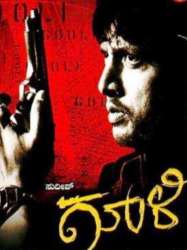
Gooli (2008)
Genres Action
Actors Sudeep, Mamta Mohandas, Kishore, Kishore Kumar, Bhavya, Sathyaraj
Rating69%





The central character Ghooli (Sudeep) is an uneducated, rude youngster and deadly mercy less cruel rowdy with whom a girl named Ramya (Mamta) accidentally falls in love by seeing his pure and unadulterated heart. Ramya continues to keep in touch with Ghooli despite opposition from her family and although Ghooli tries to keep Ramya at a distance, he finds he has also has fallen in love with her. They marry but separate shortly afterwards. Later Ghooli hears shocking news about the apparent death of Ramya, however she is not dead but in a mental asylum due to severe brain damage.

Kaun Jeeta Kaun Haara (1987)
Genres Drama, Comedy
Actors Amrish Puri, Aruna Irani, Tinnu Anand, Kishore Kumar, Amitabh Bachchan, Dinesh Hingoo
Rating61%






Karate (1983)
, 2h15Directed by Deb Mukherjee
Genres Action
Actors Mithun Chakraborty, Kishore Kumar, Deb Mukherjee, Asha Bhosle, Mazhar Khan
Rating61%





A scientist creates a diamond that can focus sun-rays to burn through anything. He hides the diamond in a necklace. Khan ( Kader Khan), in a bid to get the diamond, kills the scientist . The scientist's karate-learning sons, Desh (Deb) and Vijay (Mithun), are separated from each other and their mother. Vijay/Vijay grows up with his karate instructor while Desh is reared by a gypsy camp where he befriends Imran (Mazhar) . Khan tracks down the karate instructor who kills himself before Khan could torture him for information about the scientists missing sons and the necklace. The dying instructor gives the necklace to Vijay who later gives it to his girlfriend Aarti (Yogita) who is the instructor's daughter for safekeeping. Vijay and Aarti raid Khan's illegal go downs and kills many of his men. Desh and Imran have grown up to be master thieves and pickpockets. Khan goes to Aarti house to kill her and steal the necklace. Aarti jumps off the window using a rope ladder . However she loses the necklace which is found by Desh who is attempting a burglary in the same building. Desh realizes that its his mother's necklace where his father has hidden the priceless diamond. Khan and his henchman see him stealing the necklace and raid his house while Vijay arrives to save Aarti . Khan and his henchmen and well as Vijay try to snatch the necklace from Desh , but he escapes and disguises himself as a groom and enters a wedding ceremony. By mistake Desh gets married to Geeta (Kajal), but refuses to acknowledge her as his wife and leaves before even looking at her face. While escaping with the necklace he is chased by the Police and Vijay who shoots him. Injured he seeks asylum at a house which happens to belong to his mother. Khan's henchman try to kill Desh , who is saved by Geeta . Geeta and Desh escape on a train .The villains also enter the train and Desh beats them up and escapes again. Desh takes Geeta to the gypsy camp where she fights with Zora who is also in love with Desh. Vijay attacks Desh at the gypsy camp but Imran saves him. Geeta tells Desh that she is the same girl he got married to and Desh acknowledges her as his wife. Khan comes to know that Desh is the lost elder son of the scientist. He learns that Desh loves Imran like his brother and kills Imran in circumstances where Vijay becomes the suspect. Khan also Kills Aarti and Vijay suspects Desh for the murder. Both brothers are after each other's lives. While fighting over the necklace they realize they are brothers and Khan has killed Imran and Aarti. Desh and Vijay join hands are decide to avenge their father by killing Khan. Khan organizes a Karate competition and invites the world's most renowned Karate fighters and pays them to kill the 2 brothers.

Shabhash Daddy (1979)
Directed by Kishore Kumar
Actors Yogeeta Bali Chakraborty, Amit Kumar, Kishore Kumar, Jayasudha Kapoor
Rating28%






Badhti Ka Naam Dadhi (1974)
Directed by Kishore Kumar
Genres Drama
Actors I. S. Johar, Amit Kumar, Rajesh Khanna, Ashok Kumar, Kishore Kumar, Bappi Lahiri
Roles Himself / Jailor / Constable Kishori Lal / Constable Rafat Lal / Gypsy
Rating67%





The premise of the film is that a multimillionaire, who has no heir, decides to leave his wealth to the person who has the longest beard. What follows is complete mayhem as Kishore Kumar and K.N. Singh plot to outwit one another.

Bombay to Goa (1972)
Directed by Mehmood Ali
Genres Drama, Comedy, Action, Adventure, Romance
Themes Transport films, Road movies
Actors Amitabh Bachchan, Mehmood Ali, Aruna Irani, Shatrughan Sinha, Anwar Ali, Aachi Manorama
Roles Kishore Kumar
Rating66%





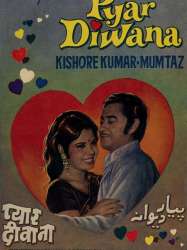
Pyaar Diwana (1972)
Genres Comedy
Actors Kishore Kumar, Mumtaz, Iftekhar, Padma Khanna, Sundar
Roles Sunil
Rating68%






Door Ka Raahi (1971)
Directed by Kishore Kumar
Actors Tanuja, Kishore Kumar, Ashok Kumar, Padma Khanna, Amit Kumar, Abhi Bhattacharya
Rating77%





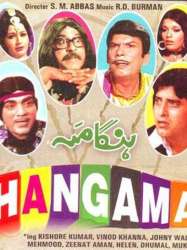
Hungama (1971)
Actors Kishore Kumar, Vinod Khanna, Zeenat Aman, Mumtaz, Anant Balwant Dhumal, Faryal
Rating69%





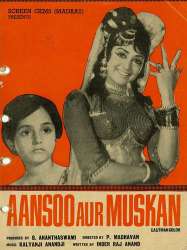
Aansoo Aur Muskan (1970)
Directed by P. Madhavan
Actors Padmini Ramachandran, David Abraham, Bindu, Syed Ishtiaq Ahmed Jaffery, Kishore Kumar, Hema Malini
Roles Pandit
Rating66%





 Connection
Connection



